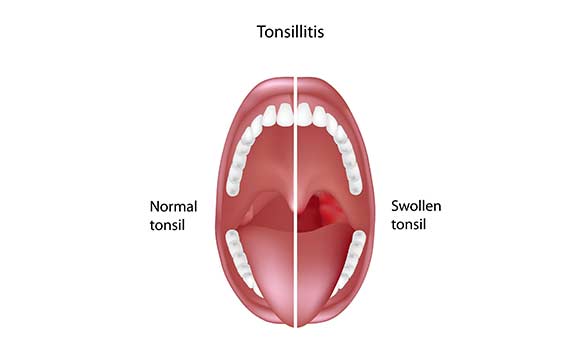
Tonsillitis is an infection of the tonsils.
Tonsillitis is sometimes seen when you have a cold or the flu because of the virus and the bacteria that is in the body. The tonsils help to keep you from getting sick by trapping the viruses and bacteria, but when there is too much in the body, the tonsils can then become infected. This is a condition that is common in children but can also impact adults who tend to frequently get sick.
- Tonsillitis is usually contagious.
- However, there are several treatments available and symptoms that you can look for if you suspect that you have tonsillitis so that you don’t spread the infection to others.
Causes
White blood cells are produced by the tonsils to ward off infections that would reach other parts of the body. Since so many types of bacteria and viruses enter through the mouth and are trapped by the tonsils, they can often become swollen and infected. Strep throat is a common cause of tonsillitis, as well as an everyday common cold, because the virus often enters through the mouth and nose. The infection is more common in children because they are often in close quarters with other children in school. Younger children tend to touch things that others have and tend to not have the same hygienic routines that adults do, making it easier for them to spread bacteria and viruses that then lead to tonsillitis.


What Are The Symptoms?
The symptoms associated with tonsillitis can sometimes mimic those that you might see if you have the flu. A severe sore throat and high fever are the two early symptoms that you will usually experience. It can sometimes be hard to swallow foods. However, in order to prevent dehydration, you should drink as many liquids as possible, such as warm tea with honey to soothe the throat. Tonsillitis can sometimes cause your stomach to hurt and can cause nausea and vomiting. This is usually only seen in severe cases. You will probably have a scratchy throat, and it will likely be difficult to talk very loud. The lymph nodes in the throat will usually become swollen because of the amount of infection in the tonsils. Chronic tonsillitis with symptoms that linger while recurrent tonsillitis occurs when you experience several infections throughout the year.
Treatment Options
Antibiotics are usually given as the first line of defense to treat the infection. Pain medications can also be prescribed for severe sore throats. Some doctors will prescribe anti-nausea medications to help calm the stomach. If antibiotics don’t work or if the infection continues to occur, then one solution is a tonsillectomy. This is a surgical treatment that involves removing the tonsils and sometimes the adenoids if they are impacted as well.
If you become dehydrated, then intravenous medications can be given for a short time so that they are introduced into the body. While at home, drink plenty of fluids, rest, and gargle with warm salt water to relieve some of the soreness associated with a sore throat.


